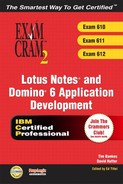Designing Web Applications That Read Non-Domino Data
In today's heterogeneous IT environments, capability to integrate applications with external, back-end systems is often necessary. Of course, Lotus Notes/Domino supports this requirement by offering several options. The benefits of building Web applications that integrate with external back-end data are numerous. Namely, this approach enables you to design applications that utilize core Domino features such as security, workflow, routing, and other automated business processes.
Domino Web applications can contain connectors to
Relational databases (such as Oracle, DB2, SQL Server, MySQL, and so on)
Enterprise Resource Planning systems (such as SAP/R3)
Transactional Systems (such as CICS, IBM MQSeries, and IMS)
One option for connecting to non-Domino data is to use Domino Enterprise Connection Services (DECS). DECS provides a visual tool and a high-performance server environment used to create Web applications that provide live, native access to enterprise data and applications. DECS includes a wizard interface that enables users to define external data source connections to DB2, Oracle, Sybase, EDA/SQL, SAP/R3, ODBC, and text files. Users can define files within a Domino database that can be automatically updated with the external connector data.
In addition to using DECS, you can use the Domino driver of JDBC to access data. The JDBC driver provides standard JDBC access to data in Domino databases so that you can use Java applications in conjunction with the JDBC standard to access native Domino data.
Developers also can use the new Domino back-end classes—made available in LotusScript and Java—when accessing non-Domino data. The new LotusScript classes NotesStream and NotesMIMEHeader, as well as new Java classes lotus.domino.Stream and lotus.domino.MIMEHeader, enable designers to develop applications that programmatically access relational databases, transaction systems, and ERP systems.
Developers can use the forms-based development tools of DECS or the new Domino object Java and LotusScript classes to create Domino Connectors. Domino connectors are modules that provide native connectivity to external sources such as relational databases, transaction systems, and ERP systems.
A new feature available with Domino 6 is the Data Connection Resource. The Data Connection Resource enables you to utilize DECS functionality from within the Domino Designer client and link Notes fields to external database fields.
 | Data Connection Resources are shared resources and can be reused within an existing database and shared across multiple databases. You can expect to be required to define this on the exam. |
An alternate option to connect to non-Domino data is to use Lotus Enterprise Integrator. Lotus Enterprise Integrator is a separate product that extends the DECS functionality by supporting high-volume data transfer and synchronization. LEI includes tools that enable users to manage integration, create event-driven data transfers, and schedule data transfers between Domino applications and relational databases and other enterprise applications without requiring anyone to perform any programming. Alternatively, LEI also allows for data transfers using LotusScript and Java.
